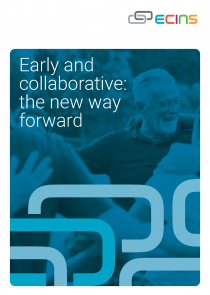by Paul Dunn, Programme Manager, ECINS
Attending this year’s conference Resolve ASB Annual Conference reconfirmed to me just how complicated and varied the anti-social behaviour (ASB) agenda has now become. We still of course prioritise investigations involving vulnerability and high risk through repeat victimisation, but we are starting to see obvious connections across a whole plethora of new agendas such as child sexual exploitation, county lines, and the exploitation and harm suffered by modern slavery, to name a few.
Complex issues such as safeguarding and mental health have long been contributory factors in local ASB investigations and continue to be but in this time of restrictions on funding and a lack of resources we seem to be being asked to do a lot more with a lot less, especially when it comes to managing risk and relying on others to help.
As organisations involved in tackling ASB, we have always faced challenges but we are now responsible for an ever increasing number of individuals with varying degrees of vulnerability, while, at the same time, pathways for support and risk management are now more limited or not easily accessed, especially by non-statutory partners.
Hence a new approach was designed to identify and target issues before they materialise, minimising costs and improving people’s life chances. The Community Multi-agency risk assessment conference (Community MARAC) has been developed and adopted to manage and problem-solve these operational challenges that face us all at such difficult times.
The panel consists of the various cross-sector agencies that are best suited to help resolve complex community concerns and their purpose is to create an environment for experts and specialists to collaborate with a range of partners to design a personalised risk reduction plan to address the problem at hand.
Community MARACs are seen as a tool for practitioners to obtain support and resolution for a range of problems, especially if it involves repeat victimisation, vulnerability or high risk complex issues which require a partnership approach due the personal and organisational risk they pose.
Any organisation who sits at the Community MARAC can refer a case into the process and in some areas that now includes local General practitioners and elected councillors amongst others who need to bring a concern to the attention of others. There are no fixed risk thresholds for referral and complex cases which do not fall immediately or easily into established categories are welcome.
The Community MARAC’s multi-agency approach and specialist input promotes an ethos of joint ownership, accountability and credibility amongst its membership and, due to the diverse range of organisations involved, encourages creativity and innovation. There is a sense of trust and value in those who participate which culminates in an environment for true and effective problem-solving and resolution.
This approach puts an end to the ‘pinball’ effect of referral and re-referral of vulnerable people to a range of different support agencies by ensuring partnerships collectively identify options and tactics to target high risk subjects and protect vulnerable victims. It also acts as a safety net to stop high risk cases being missed by others.
Referrals are wide and varied especially where there are links to mental health and personality disorders, especially if, as we all know, the person concerned refuses to engage with support services. Or those difficult cases that take time to resolve or can’t be resolved without the involvement of others who are reluctant to participate, such as adults who are living alone and have been befriended or exploited by others, or the repeat caller to services that puts unrealistic expectations onto the emergency services, especially if they are displaying paranoid or psychotic behaviour. The list is endless but Community MARACs appear to be working and there is evidence now to prove it.
Interesting facts are already emerging from early evaluations that state that many ASB cases are wrongly classified or sent to the wrong panel, worryingly it also shows the potential risk that some frontline practitioners are sitting on, due to unhelpful organisational procedures, or a lack of knowledge of the local partnership and a reluctance in some cases to escalate, especially where they can’t be proved due to limited information known.
At present, 60% of London boroughs have adopted the concept with growing interest elsewhere. The process has already started to evidence cost and time efficiency and recorded case studies have confirmed a sustainable and measurable success in managing complex individuals. Initial benefits also include a consistent approach for cross boundary concerns, identifying gaps in service and responsibilities of care.
All partnerships that have adopted Community MARACs have seen an improvement in partnership participation and joint ownership of local concerns. It’s more than that though, partners learn more about what others can bring to the table for example when did you last go back to Victim’s Support or mediation services and asked them what facts did they establish which might help future investigations?
As far as the future is concerned, the National Police Chiefs Council has documented Community MARACs as good practice and one pilot is currently being evaluated by the College of Policing. It has been adopted by local Safeguarding Adult Boards as a means to not only problem-solve vulnerable adults but assist in identifying local emerging issues that might require more resources in the future.
Finally, to continually identify and adopt improvements to the process, a number of Community MARACs have adopted ECINS as a case management system so all meetings are on line and information is securely shared and managed without the need for paper copies.
To assist with implementation of Community MARACS the Metropolitan Police Service has produced a toolkit to provide consistency and clarity for those considering introducing the successful approach that is now being seen as the future to partnership problem-solving of local community priorities.


